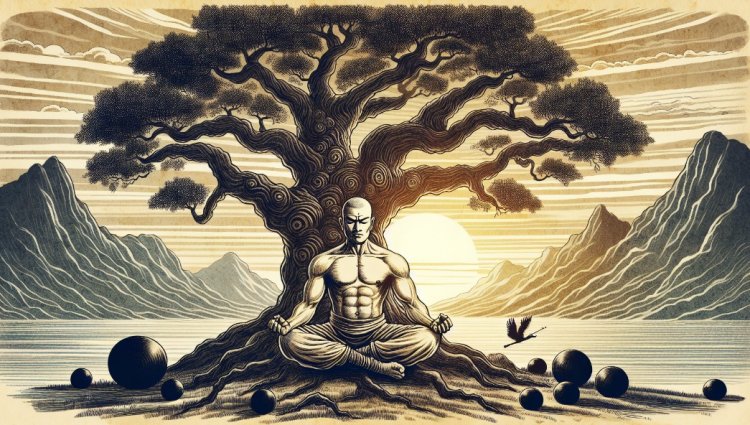Kung Fu and Zen Buddhism: The Origins of an Ancient Tradition
Unleash the inner warrior! Dive into the intertwined origins of Kung Fu and Zen Buddhism, where mindfulness meets martial arts. Discover the path to enlightenment through physical discipline and spiritual awakening.

The Legend of Bodhidharma
Today, Kung Fu and Zen Buddhism are synonymous with China and the Far East. However, did you know that these ancient practices can be traced back to a legendary Indian monk named Bodhidharma? Bodhidharma, the first patriarch of Zen Buddhism, was the initial force behind the development of Kung Fu. Let's take a journey back in time to understand the fascinating origins of these practices.
Early Life and Renunciation
Bodhidharma was born in 440 CE in the imperial capital of Kipurum, India. His father, King Simav Arma, preferred him to succeed to the throne despite being the youngest of three sons. This preference angered his two older brothers, who tried to interfere and eventually attempted to assassinate Bodhidharma. Despite surviving the assassination attempt, he became disenchanted with a career in politics and decided to renounce his royal claims.
A Spiritual Journey
After renunciating his royal claims, Bodhidharma embarked on a spiritual journey. He traveled to Magada in the north, where he received training in the Dharma from the famed Buddhist teacher Patara, who many believe was a woman. Inspired by his training, Patara suggested that Bodhidharma should travel to China to spread the faith.
Arrival in China
In 475 CE, Bodhidharma arrived in southern China at the bustling port of Guango. He began preaching in busy metropolitan areas, such as Guango, where Buddhism had not yet become popular among commoners. During this time, Bodhidharma lived and worked at Hin Temple and nearby Guang Temple.
Controversy and Legacy
In 490 CE, Bodhidharma had a famous interaction with Emperor Wu of the new Chi Dynasty. When the emperor asked about the merits he would receive for building Buddhist temples, Bodhidharma explained the Zen-like doctrine of emptiness, stating that the emperor would receive no merit for his actions. Emperor Wu gave the order for Bodhidharma to leave his sight right away because of this response.
Bodhidharma moved to Pinang, the capital of the Northern Way, where he continued to travel and teach. He eventually settled at the Shaolin Monastery, where he is believed to have transmitted his knowledge of Indian martial arts to the monks. While Bodhidharma's exact fate is unknown, his teachings and legacy live on in the Shaolin martial arts tradition.
The Influence of Indian Martial Arts
India has a rich history of martial arts traditions that influenced Bodhidharma's teachings at the Shaolin Monastery. In South India, where Bodhidharma originated, four martial arts traditions are believed to have influenced him: Kalaripayattu, Silambam, Varma Kalai, and Varma Adi. These traditions included various weapons-based techniques, pressure point attacks, and unarmed combat.
Bodhidharma's Impact on Zen Buddhism
While Bodhidharma is not the founder of Zen Buddhism, he played a crucial role in introducing and popularising Zen practice in China and the Far East. His unique approach to Zen attracted followers and influenced the development of Zen Buddhism throughout East Asia. Today, Bodhidharma is widely regarded as one of the most important figures in Zen Buddhism.
The legacy lives on.
Bodhidharma's teachings didn't remain limited to China. Over time, his strain of Buddhism spread to Korea and Japan, where it had a significant impact on their respective cultures. In Japan, Bodhidharma became known as Dharma and was revered as a bringer of good luck and a protector of children. Even today, his cultural role is celebrated through Dharma dolls, which are given as gifts during major festivals and events.
Conclusion
Bodhidharma's journey from India to China brought together the worlds of Kung Fu and Zen Buddhism. His teachings and influence continue to shape the practices and traditions of martial arts and spirituality in East Asia. While the exact details of his life may be shrouded in legend and folklore, Bodhidharma's lasting impact is undeniable. So next time you practice Kung Fu or study Zen Buddhism, remember the legendary Indian monk who started it all.



 admin
admin 










